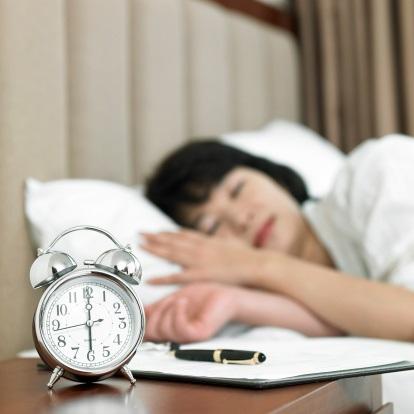Getting the sleep you need is a powerful way to improve your health, mood, and productivity. The HealthPoint Wellness and the HealthPoint EAP are partnering on sleep health initiatives. This site offers a few ways to start exploring and improving your own sleep health. Start by checking out our our sleep health tips at 40 Winks on the 40 Acres (PDF).
Sleep Information, Resources, and Tips
Sleep Tools & Tips
The National Sleep Foundation has useful tips and resources for providing sleep health education and tools to help you with tracking your sleep habits.
In addition to these resources, they also have a bedtime calculator to help you know when to go to bed and/or wake up for better sleep health as well as a sleep app for monitoring your sleep health and data that you may find useful.
How Long Should People Sleep at Different Ages?
The National Sleep Foundation offers recommendations for how much sleep people need by age, from newborns to older adults.
Sleep Diary

A sleep diary is a tool you can use to track your sleep and sleep related habits. You can use the diary to identify what is helping you sleep well and what can be improved to sleep better.
Sleep Diary Examples:
- https://www.sleepfoundation.org/sleep-diary
- The Division of Sleep Medicine at Harvard Medical School Sleep Diary (PDF)
There are also numerous ways to track your daily sleep patterns with electronic devices. There are free apps that can assist you in learning about and improving your sleep habits. For example, Sleep Coach by SWAN Medical Group that can help you have reminders toward building habits for better sleep, such as daily reminder alarms to stop using electronics, stop all caffeine for the day, and start relaxation exercises. CBT-I Coach by the US Department of Veterans Affairs (VA) is another example of a free app with educational information about sleep and a detailed sleep diary.
How to Set Up Your Bedroom to Encourage Better Sleep
The National Sleep Foundation has tips for how to use your senses to create the best environment for sleep
Stress Management for Better Sleep
If stress is impacting your ability to sleep well, check out the services of UT Austin’s HealthPoint Employee Assistance Program (EAP). The EAP offers stress management classes, counseling, and the Stress Reduction Biofeedback Center.
Sleep Health
There is a lot of information on sleep health available online. The following sites are examples of places to find information about improving sleep health. Your medical providers can also consult about sleep and any possible sleep problems that you may be having.
- Harvard Sleep Medicine– This main portal takes you to a page with four areas: healthy sleep, “get sleep,” apnea, and narcolepsy.
- Why sleep is important and what happens when you don’t get enough from the American Psychological Association
- Life Care – LifeCare has a range of articles on sleep and other wellness topics.
Shift Work
Shift work can take place during times that interfere with daily schedules for sleep, such as during evening, early morning, or night hours. Rotating shifts can also impact daily sleep and wake cycles. The National Sleep Foundation has tips to improve sleep and manage the impact of shift work.
Sleep and Travel
Traveling for work or pleasure can impact and significantly disrupt your sleep. The National Sleep Foundation has a brief video and tips on how to minimize the impact of jet lag and sleeping in an unfamiliar environment.
Sleep Disorders
If you work to improve your sleep and follow good sleep health tips, but still have significant sleep issues, check out the symptoms of common sleep disorders to see if you need to speak to your doctor about being screened for a sleep disorder. Undiagnosed and untreated sleep disorders can impact sleep and cause daily symptoms. Chronic insomnia is one of the most common sleep disorders. Insomnia is difficulty falling and staying asleep, along with distress or impairment resulting from the sleep problems. Insomnia can include symptoms such as fatigue, difficulty concentrating, decreased work performance, irritability, and low energy. Click here to learn more about insomnia.
To learn about other sleep disorders, such as Obstructive Sleep Apnea, Restless Leg Syndrome, and Narcolepsy, check out the following sites:
Video Learning
Learn from Dr. Patricia Carter, former UT Austin professor in the School of Nursing - The following videos are from the University Lecture Series. Dr. Carter’s talk is the first 20 minutes of each video.
